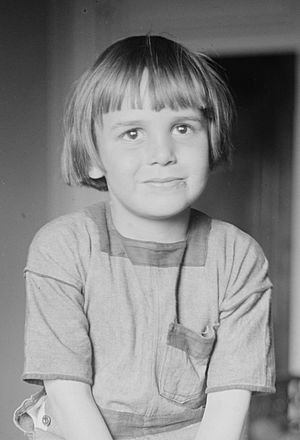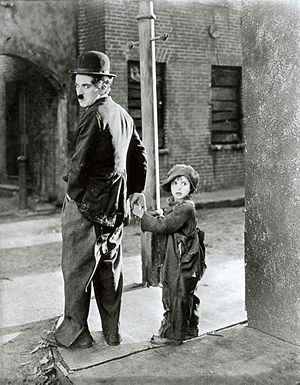Jackie Coogan facts for kids
Quick facts for kids
Jackie Coogan
|
|
|---|---|
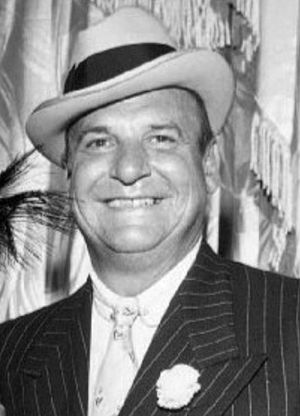
Coogan in 1962
|
|
| Born |
John Leslie Coogan
October 26, 1914 Los Angeles, California, U.S.
|
| Died | March 1, 1984 (aged 69) Santa Monica, California, U.S.
|
| Burial place | Holy Cross Cemetery, Culver City |
| Occupation |
|
| Years active | 1917–1984 |
| Spouse(s) |
Flower Parry
(m. 1941; div. 1943)Ann McCormack
(m. 1946; div. 1951)Dorothea Lamphere
(m. 1952) |
| Children | 4 |
| Relatives | Robert Coogan (brother) Keith Coogan (grandson) |
John Leslie Coogan (born October 26, 1914 – died March 1, 1984) was an American actor and comedian. He started his movie career as a child actor in silent films. Jackie Coogan became one of Hollywood's first child stars. This happened after he starred in Charlie Chaplin's famous film The Kid in 1921.
Later in his life, Coogan had to go to court over his earnings from when he was a child star. This led to California creating the first law to protect the money earned by child performers. This law is known as the "Coogan Act".
Jackie Coogan kept acting throughout his life. He became famous again when he was older for playing Uncle Fester in The Addams Family TV show in the 1960s.
Contents
Jackie Coogan's Early Life and Career
John Leslie Coogan was born in Los Angeles, California, in 1914. His parents were John Henry Coogan, Jr., and Lillian Rita (Dolliver) Coogan. Jackie started performing when he was a baby. He appeared in both vaudeville shows and movies. His first movie role was in Skinner's Baby in 1917.
The famous actor Charlie Chaplin discovered Jackie at the Orpheum Theatre in Los Angeles. Jackie was on stage doing a popular dance called the shimmy. Jackie's father was also an actor, and so was his younger brother, Robert.
Jackie Coogan was very good at copying people. Charlie Chaplin was delighted by his talent. Chaplin gave him a small part in his film A Day's Pleasure (1919). The next year, Chaplin chose Jackie to play the abandoned child in his silent comedy-drama The Kid (1921).
In 1922, Jackie Coogan played the main character in Oliver Twist. This movie was directed by Frank Lloyd. Jackie was one of the first stars to have many products made with his name on them. Things like peanut butter, stationery, whistles, dolls, and coins were sold with Jackie Coogan's image.
Jackie Coogan's Education and a Sad Accident
Jackie Coogan had tutors until he was 10 years old. Then he went to military schools and other prep schools. He also attended several colleges, including the University of Southern California. In 1932, he left Santa Clara University because his grades were not good enough.
Sadly, in May 1935, Jackie was in a very serious car accident. He was 20 years old at the time. His father, his best friend Junior Durkin, and two other people passed away in the crash. Jackie was the only person who survived the accident.
Jackie Coogan's Charity Work
When Jackie Coogan was a child actor, he did a lot of charity work. He worked with Near East Relief. In 1924, he traveled across the United States and Europe. He was on a "Children's Crusade" to raise money.
His efforts helped collect over $1 million in clothing, food, and other donations. This would be about $14.8 million today. Officials in the United States and Greece honored him for his work. He even met Pope Pius XI.
The Coogan Act: Protecting Child Actors
As a child star, Jackie Coogan earned a lot of money, estimated to be between $3 and $4 million. When he turned 21 in October 1935, he expected his money to be safe. His father had managed his earnings carefully before he passed away in the car accident.
However, Jackie soon found out that almost all his money was gone. His mother and stepfather had spent it on expensive items like fur coats, diamonds, and cars. Jackie's stepfather had been the family's financial advisor.
Jackie's mother and stepfather said that Jackie enjoyed acting and just thought he was playing. They claimed they never promised to give Jackie anything. In 1938, Jackie sued them to get his money back. After paying for his legal costs, he only received about $126,000 of the money that was left. When Jackie ran out of money during the lawsuit, Charlie Chaplin helped him by giving him $1,000.
This legal battle brought attention to child actors' earnings. It led to a new law in California in 1939. This law is often called the "Coogan Law" or the "Coogan Act". It requires that a child actor's employer put 15% of their earnings into a special trust account. This account is called a Coogan account. The law also set rules for a child actor's schooling, work hours, and time off.
Jackie Coogan's Adult Career
Movies and Radio
Jackie Coogan continued acting in movies as an adult. He appeared with his wife at the time, Betty Grable, in College Swing (1938). This was a musical comedy with other stars like George Burns and Bob Hope. In 1965, he played a police officer in the Elvis Presley comedy Girl Happy.
In 1940, Jackie Coogan acted in a radio show called Society Girl on CBS. He also had his own radio program, Forever Ernest, in 1946.
Jackie Coogan in World War II
Jackie Coogan joined the U.S. Army in March 1941. After the attack on Pearl Harbor in December of that year, he asked to join the Army Air Forces. He wanted to be a glider pilot because he already knew how to fly.
He graduated from the Advanced Glider School as a glider pilot. He then volunteered for dangerous missions with the 1st Air Commando Group. In December 1943, his unit was sent to India. On March 5, 1944, he flew British troops, known as the Chindits, into the jungle in Burma. They landed at night behind Japanese lines during the Burma Campaign.
Television Fame as Uncle Fester
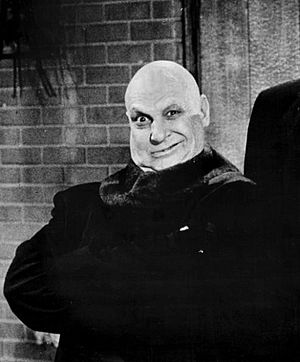
After the war, Jackie Coogan returned to acting. He mostly played supporting roles and appeared on television. From 1952 to 1953, he played Stoney Crockett in the TV series Cowboy G-Men. He also appeared in shows like Peter Gunn and The Martha Raye Show.
Jackie Coogan found his most famous television role as Uncle Fester in ABC's The Addams Family. This show ran from 1964 to 1966. He also appeared four times on the Perry Mason series. He was a guest on The Red Skelton Show, The Brady Bunch, I Dream of Jeannie, and many other popular shows until he retired in the mid-1970s.
Jackie Coogan's Family Life
Jackie Coogan was married four times and had four children. His first marriage was to actress Betty Grable from 1937 to 1939. He later married Flower Parry and had a son, John Anthony Coogan. His third marriage was to Ann McCormack, and they had a daughter, Joann Dolliver Coogan.
His fourth wife was Dorothea Odetta Hanson, also known as Dodie. They were married for over 30 years until his death in 1984. They had two children together: a daughter named Leslie Diane Coogan and a son named Christopher Fenton Coogan.
Jackie's grandson, Keith Coogan, is also an actor. Keith was born Keith Eric Mitchell and started acting in 1975. He changed his name to Keith Coogan in honor of his grandfather. You can see footage of Jackie with his grandson Keith in the 1982 documentary Hollywood's Children.
Jackie Coogan's Passing
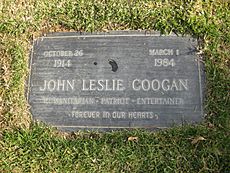
Jackie Coogan passed away on March 1, 1984, at the age of 69. He had been dealing with heart and kidney problems. He died from heart failure in Santa Monica, California.
Jackie had a history of heart issues and high blood pressure. He had also experienced several strokes. At his request, his funeral was open to the public. Many fans attended, and John Astin, who played Gomez Addams alongside Jackie in The Addams Family, gave a speech. Jackie Coogan was buried at Holy Cross Cemetery in Culver City. He has a star on the Hollywood Walk of Fame at 1654 Vine Street.
Filmography
See also
 In Spanish: Jackie Coogan para niños
In Spanish: Jackie Coogan para niños


